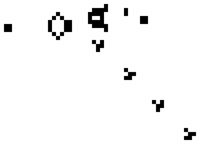
Photo from wikipedia
Our main goal is to study a class of processes whose increments are generated via a cellular automata rule. Given the increments of a simple biased random walk, a new… Click to show full abstract
Our main goal is to study a class of processes whose increments are generated via a cellular automata rule. Given the increments of a simple biased random walk, a new sequence of (dependent) Bernoulli random variables is produced. It is built, from the original sequence, according to a cellular automata rule. Equipped with these two sequences, we construct two more according to the same cellular automata rule. The construction is repeated a fixed number of times yielding an infinite array ($\{-K,\ldots,K\}\times\N$) of (dependent) Bernoulli random variables. %In turn, using this new sequence as input, we reiterate a construction of a new sequence. %This process is repeated a finite number of times resulting in an infinite array, herein called the "downward process", of highly dependent Bernoulli random variables. The process of taking partial products can be reversed allowing to construct new sequences, herein called the "upward process", the characteristics of which are different from the downward process. Taking partial sums of these sequences, we obtain a $(2K+1)$-dimensional process whose increments belong to the state space $\{-1,1\}^{2K+1}$. The aim of the paper is to study the long term behaviour of this process. In particular, we establish transience/recurrence properties and prove an invariance principle. The limiting behaviour of these processes depends strongly on the direction of the iteration, and exhibits few surprising features. This work is motivated by an earlier investigation in which the starting sequence is symmetric.
Journal Title: Stochastic Processes and their Applications
Year Published: 2019
Link to full text (if available)
Share on Social Media: Sign Up to like & get
recommendations!